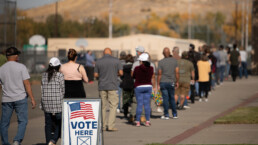More than 15 million people now have access to ranked elections, and that number is only growing.
by David Daley, In These Times
We still don’t know how close House Democrats were to winning a majority, and the final margin in the U.S. Senate hangs on a December runoff in Georgia. We are bitterly divided — nearly split in seats in the House, Senate and governor’s mansions, with our parties like warring armies fighting trench warfare in a shrinking handful of battlegrounds. But the election produced two clear outcomes. Election deniers went down in flames in every close race, and ranked choice voting (RCV) stayed on its soaring upward trajectory.
Millions of people understandably are frustrated with the anti-majoritarian nature of our system. These days, it feels like a feature and not a bug. Since 1988, Republicans have won the most votes in a presidential election only once, yet served 16 years in the White House and appointed seven Supreme Court justices. By 2040, two-thirds of U.S. residents will live in just 15 states, but the Senate — and the filibuster — give older, rural, whiter states veto power over popular legislation. The combination has ended the right to reproductive freedom, with the U.S. Supreme Court governed by five justices appointed by presidents who lacked majority support, and confirmed by an unrepresentative Senate.

Yet it’s also easy to see hope and signs of democratic renewal. In cities and states nationwide, all varieties of red, blue and purple, people have come together behind reforms to improve democracy and show all of us a path forward. Perhaps no reform has more momentum behind it than RCV, which works like an instant runoff: When voters have more than two choices, they can rank their choices top to bottom. If no candidate wins 50% in the first round, the last place candidate is eliminated, and the second choices kick in. Even as voting rights have become a depressingly polarized topic in our current crisis of democracy, RCV has been increasing in popularity nationwide. For a growing number of people, voting now means ranking.
Recent Posts
‘Unconstitutional. Unethical. Authoritarian.’ ICE Bars Millions Of Immigrants From Bond Hearings
July 18, 2025
Take Action Now One watchdog said the new policy “seems like a blatant attempt to stop them from exercising their right to due process.”……
Americans Are Not Nearly Alarmed Enough About Climate Change
July 18, 2025
Take Action Now Americans still don’t comprehend how imminent, dangerous, and far-reaching the threat is—and journalists are partly to blame.By…
The IRS Is Building A Vast System To Share Millions Of Taxpayers’ Data With ICE
July 17, 2025
Take Action Now ProPublica has obtained the blueprint for the Trump administration’s unprecedented plan to turn over IRS records to Homeland Security…
Israel’s Sudden Assault On Syria Is Unchecked Aggression
July 17, 2025
Take Action Now Jerusalem is bombing Damascus and threatening al-Sharaa’s rule, while Washington was hoping to help the nascent government on…




